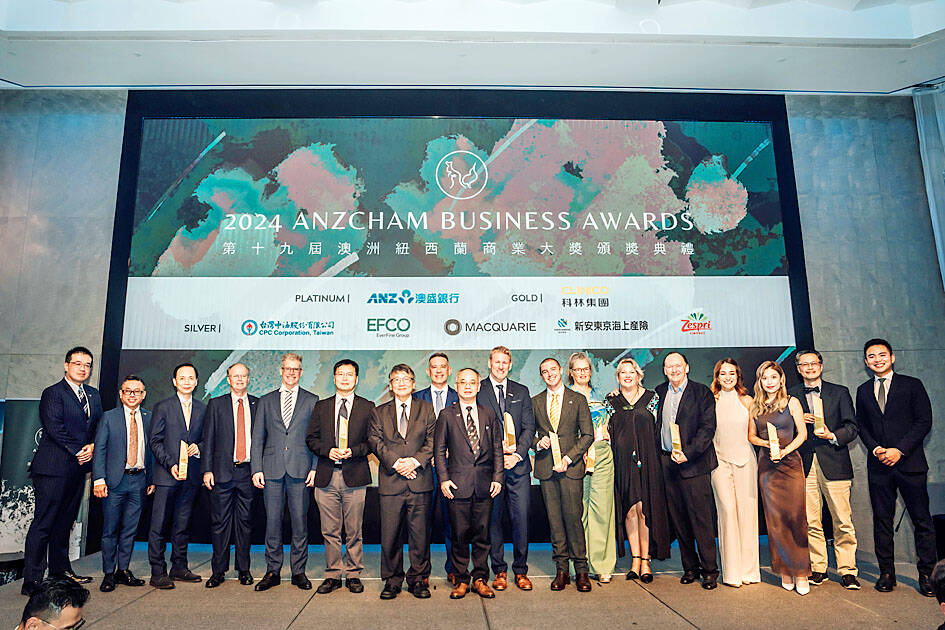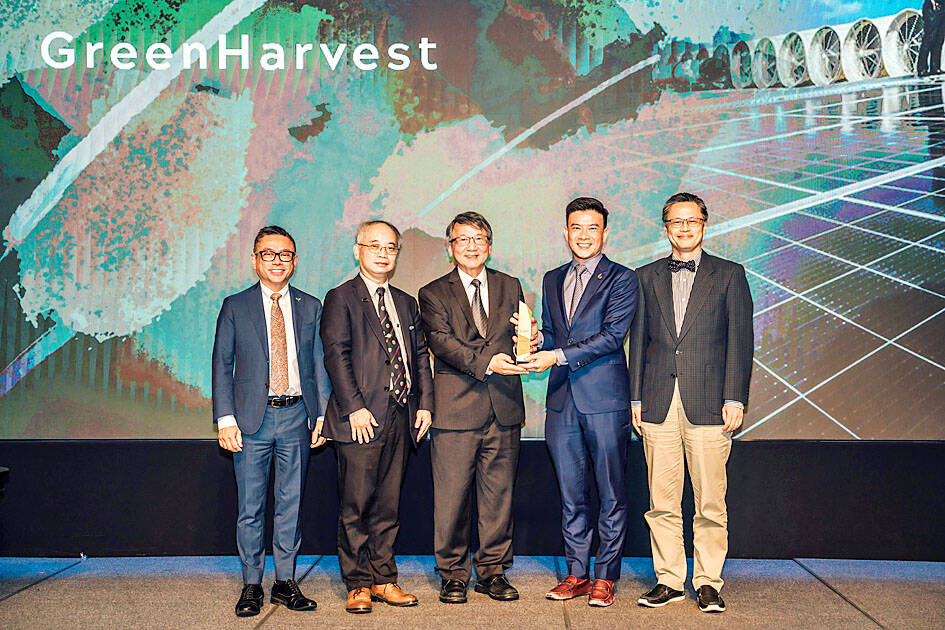On September 10, 2024, GreenHarvest was honored with the Australia-Taiwan Partnership Award at the 19th Annual ANZCham Business Awards, held at the Shangri-La’s Far Eastern Plaza Hotel in Taipei. This prestigious recognition not only highlights GreenHarvest’s steadfast commitment to fostering business ties between Australia and Taiwan, but also acknowledges the company’s significant contributions to the sustainable energy sector.
Since its inception, GreenHarvest has been at the forefront of promoting renewable energy development. Driven by its core values of innovation, collaboration, and sustainability, the company aims to establish itself as a one-stop service provider for RE100 solutions, empowering the Taiwanese government and local businesses to achieve their green transition goals and play a pivotal role in the global energy transformation. With an impressive portfolio of over 300 MW of installed solar capacity, GreenHarvest is on track to introduce more than 200 million kWh of green energy into the market annually.

Photo provided by GreenHarvest
THE ORIGINS OF THE GREEN HYDROGEN PROJECT
Since 2020, GreenHarvest has actively engaged in renewable energy trading, supplying renewable electricity to over 130 locations. Last year, the company partnered with the governments of Tainan City and Chiayi County to launch a renewable energy supply platform aimed at enhancing local businesses’ access to renewable electricity. Through in-depth research, GreenHarvest has identified green hydrogen as a crucial component in achieving 100% renewable electricity penetration in the future.
AUSTRALIA’S GREEN HYDROGEN ADVANTAGE

Photo provided by GreenHarvest
In its pursuit of green hydrogen solutions, GreenHarvest participated in the Taiwan-Australia Joint Energy and Minerals, Trade and Investment Cooperation Consultations, uncovering Australia’s substantial advantages in green hydrogen production. With a land area 130 times that of Taiwan, Australia boasts vast expanses of affordable land and abundant sunlight, resulting in some of the lowest solar power generation costs globally. The cost of renewable electricity in Australia is less than NT$1 per kilowatt-hour, approximately one-fifth of Taiwan’s renewable electricity purchase price. Recent government initiatives, including renewable energy and green hydrogen subsidy programs, have further solidified GreenHarvest’s confidence in investing in Australia’s green hydrogen sector.
INTERNATIONAL COLLABORATION
GreenHarvest prioritizes Australia as a strategic partner. With active support from both the Taiwanese and Australian governments, and after multiple evaluations over a period of a year and a half, GreenHarvest signed an exclusive cooperation agreement in May with Australia’s H2U for a large-scale green hydrogen project. This collaboration will leverage Taiwan’s semiconductor expertise in water resource management and encourage Taiwanese companies to engage in hydrogen production through water electrolysis. Additionally, GreenHarvest plans to offer renewable energy forecasting and power dispatch technologies to optimize the green hydrogen production process, further enhancing the strategic partnership in sustainable energy between Taiwan and Australia.
LOOKING AHEAD: A COMMITMENT TO SUSTAINABLE ENERGY
This award not only highlights GreenHarvest’s achievements in the green hydrogen sector but also underscores the importance of international collaboration in addressing global energy challenges. GreenHarvest looks forward to continuing its mission of promoting sustainable energy solutions while further strengthening the cooperative relationship between Taiwan and Australia.
Chairman KH Chen stated, “This award is a testament to our team’s relentless dedication and innovation. We remain committed to advancing hydrogen energy technology and contributing to the global energy transition.”

SEMICONDUCTORS: The German laser and plasma generator company will expand its local services as its specialized offerings support Taiwan’s semiconductor industries Trumpf SE + Co KG, a global leader in supplying laser technology and plasma generators used in chip production, is expanding its investments in Taiwan in an effort to deeply integrate into the global semiconductor supply chain in the pursuit of growth. The company, headquartered in Ditzingen, Germany, has invested significantly in a newly inaugurated regional technical center for plasma generators in Taoyuan, its latest expansion in Taiwan after being engaged in various industries for more than 25 years. The center, the first of its kind Trumpf built outside Germany, aims to serve customers from Taiwan, Japan, Southeast Asia and South Korea,

Gasoline and diesel prices at domestic fuel stations are to fall NT$0.2 per liter this week, down for a second consecutive week, CPC Corp, Taiwan (台灣中油) and Formosa Petrochemical Corp (台塑石化) announced yesterday. Effective today, gasoline prices at CPC and Formosa stations are to drop to NT$26.4, NT$27.9 and NT$29.9 per liter for 92, 95 and 98-octane unleaded gasoline respectively, the companies said in separate statements. The price of premium diesel is to fall to NT$24.8 per liter at CPC stations and NT$24.6 at Formosa pumps, they said. The price adjustments came even as international crude oil prices rose last week, as traders

Taiwan Semiconductor Manufacturing Co (TSMC, 台積電), which supplies advanced chips to Nvidia Corp and Apple Inc, yesterday reported NT$1.046 trillion (US$33.1 billion) in revenue for last quarter, driven by constantly strong demand for artificial intelligence (AI) chips, falling in the upper end of its forecast. Based on TSMC’s financial guidance, revenue would expand about 22 percent sequentially to the range from US$32.2 billion to US$33.4 billion during the final quarter of 2024, it told investors in October last year. Last year in total, revenue jumped 31.61 percent to NT$3.81 trillion, compared with NT$2.89 trillion generated in the year before, according to

PRECEDENTED TIMES: In news that surely does not shock, AI and tech exports drove a banner for exports last year as Taiwan’s economic growth experienced a flood tide Taiwan’s exports delivered a blockbuster finish to last year with last month’s shipments rising at the second-highest pace on record as demand for artificial intelligence (AI) hardware and advanced computing remained strong, the Ministry of Finance said yesterday. Exports surged 43.4 percent from a year earlier to US$62.48 billion last month, extending growth to 26 consecutive months. Imports climbed 14.9 percent to US$43.04 billion, the second-highest monthly level historically, resulting in a trade surplus of US$19.43 billion — more than double that of the year before. Department of Statistics Director-General Beatrice Tsai (蔡美娜) described the performance as “surprisingly outstanding,” forecasting export growth